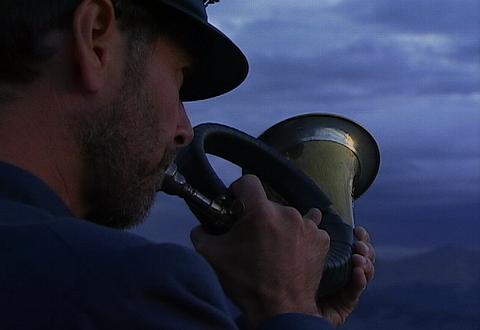|
<< -- 3 -- Sissy von Kotzebue PAS DE POSTHORN

The posthorn and also the postillion come from the world of romantic aestheticism.
Although there were many poets using the posthorn / postillion image, there was a concrete poem Mahler had in mind when writing the Posthorn episode. As explained on Jason Starr's recent DVD What the Universe Tells Me ... unravelling the mysteries of Mahler's Third Symphony (VAI DVD 4267 new release, 2 CDs, 2004, Video Arts International), a reviewer of one of the first performances of the third symphony wrote that this segment reminded him of a poem by Nikolaus Lenau (1802-1850), called Der Postillion (1833). Mahler was astounded by this review and he called in the reviewer and said: 'How did you know? This is precisely the poem I had in mind.'

A still frame of the posthorn player from Jason Starr's DVD 'What the Universe Tells Me ...' Photo © Video Arts International
|
Der Postillion (1833) by Nikolaus Lenau (1802-1850)
(English translation below)
Lieblich war die Maiennacht,
Silberwölklein flogen,
Ob der holden Frühlingspracht
Freudig hingezogen.
Schlummernd lagen Wies' und Hain,
Jeder Pfad verlassen;
Niemand als der Mondenschein
Wachte auf der Straßen.
Leise nur das Lüftchen sprach,
Und es zog gelinder
Durch das stille Schlafgemach
All der Frühlingskinder.
Heimlich nur das Bächlein schlich,
Denn der Blüten Träume
Dufteten gar wonniglich
Durch die stillen Räume
Rauher war mein Postillion,
Ließ die Geißel knallen,
Über Berg und Tal davon
Frisch sein Horn erschallen.
Und von flinken Rossen vier
Scholl der Hufe Schlagen,
Die durchs blühende Revier
Trabten mit Behagen.
Wald und Flur im schnellen Zug
Kaum gegrüßt -- gemieden;
Und vorbei, wie Traumesflug,
Schwand der Dörfer Frieden.
Mitten in dem Maienglück
Lag ein Kirchhof innen,
Der den raschen Wanderblick
Hielt zu ernstem Sinnen.
Hingelehnt an Bergesrand
War die bleiche Mauer,
Und das Kreuzbild Gottes stand
Hoch, in stummer Trauer.
Schwager ritt auf seiner Bahn
Stiller jetzt und trüber;
Und die Rosse hielt er an,
Sah zum Kreuz hinüber:
'Halten muß hier Roß und Rad,
Mags euch nicht gefährden;
Drüben liegt mein Kamerad
In der kühlen Erden!
Ein gar herzlieber Gesell!
Herr, 's ist ewig schade!
Keiner blies das Horn so hell
Wie mein Kamerade!
Hier ich immer halten muß,
Dem dort unterm Rasen
Zum getreuen Brudergruß
Sein Leiblied zu blasen!'
Und dem Kirchhof sandt´ er zu
Frohe Wandersänge,
Daß es in die Grabesruh
Seinem Bruder dränge.
Und des Hornes heller Ton
Klang vom Berge wieder,
Ob der tote Postillion
Stimmt' in seine Lieder.
Weiter ging's durch Feld und Hag
Mit verhängtem Zügel;
Lang mir noch im Ohre lag
Jener Klang vom Hügel.
The Postillion
(English translation by S v Kotzebue)
Pleasing was this night of May,
Silverclouds were flying,
By the gracious spring's splendour
Joyously attracted.
Slumbering lay lawn and grove,
Every path abandoned;
None but moon's pale light
Kept guard by the roadside.
Gently spoke a breath of air,
Even blew more mildly
Through the silent bedrooms
Of all spring born children.
Clandestinely the brooklet crawled
For the blossoms' dreams
Scented so delightfully
These silent chambers.
Coarser was my postillion,
Let his scourge go cracking,
Over hill and valleys
Freshly sounding his horn.
From four horses, quick as flash
Hoof's beat was asounding,
As through blooming hunting ground
They were trotting with contentment.
Forrest and field rush by in hasty course,
Hardly even greeted -- avoided;
And gone, like flight of dreams,
Vanished the villages' peace.
In the midst of May's delight
Was a churchyard lying,
That a wanderer's cursory glance
Stopped for serious contemplation.
Leaning against the mountain's rim
Was a pale grey wall,
And God's crucifixion effigy
Stood high in silent sorrow.
Coachman driving along his path
More tacit now and weary;
Brings his horses to a halt,
Staring at the cross up there.
'Steed and wheel must here stand still,
Should you be kept safe from harm,
My comrade's lying over there
Deep under the cool earth!
And such appealing a fellow he was!
Lord, it's a thousand pities!
No one blew the horn so fast,
Fast as my comrade did!
Here I always have to halt,
To him, lying there under greensward,
Blow in faithful brotherhood
His favourite song.'
And to the graveyard now he sent
Happy wanderer's tunes,
Should like to sound them through the deathly silence
To his brother's final place of rest.
And the bright tone of his horn
Resounded from the hills,
As if the deceased postillion
Had joined in to his songs.
Through field and grove again I went
Charging at full gallop forward;
In my ears for a long time stayed
That sound from the hills.
Continue >>
Copyright © 13 July 2004
Sissy von Kotzebue, Germany

| 
